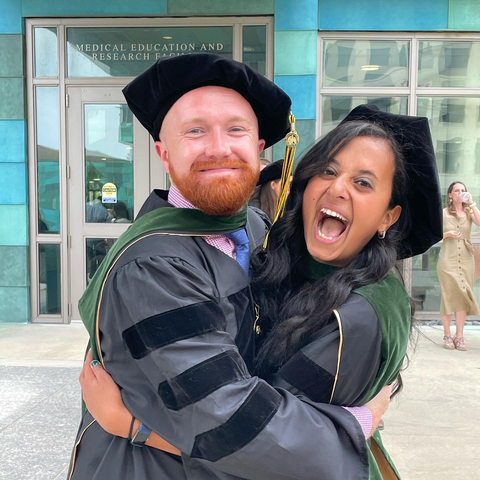
Mitchell Hooyer, MD
Undergrad: Drake University, Biochemistry
Now: Resident physician in emergency medicine at the University of Michigan
Joyce Wahba, MD
Undergrad: University of California Berkley, Chemical Biology
Now: Resident physician in emergency medicine at Harbor UCLA Medical Center
For some medical students, the calling to serve others is not just the foundation for their careers—it’s their guiding star. The University of Iowa Carver College of Medicine’s Service Distinction Track exists to help these students gain experience working with medically underserved, marginalized, and rural populations during medical school and inform them on important topics related to service-oriented health careers.
Mitchell Hooyer, MD, was one of these students. He discovered his desire to pursue medicine through his work as an emergency medical technician in high school and spent much of his free time in high school and college volunteering. That didn’t stop when he entered medical school.
“I was doing it because I love doing it,” Hooyer says.
One of his advisors, Robin Paetzold, noticed that he was gravitating toward service work and invited him to meet with Sam Ziemba, the Service Distinction Track’s director. That conversation set Hooyer on a path that made him the trainee physician he is today.
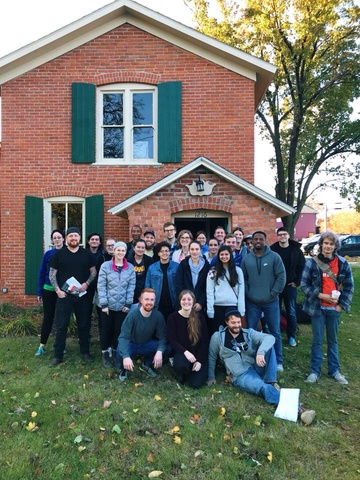
Reducing harms
Hooyer got involved with the Iowa Harm Reduction Coalition (IHRC), an Iowa City-based nonprofit that provides services and supplies for people who use drugs. He had previous experience in his own life with people who used drugs, so he was passionate about providing judgment-free services to help make their lives safer.
“The organization was pretty brand new when I joined, but very, very impressive,” he says. “They managed to practice what they preach and make it very much an organization driven for and by people who use drugs. Those were the people I wanted to spend my time with.”
Hooyer staffed the community office where clients could receive hepatitis C and HIV testing, clean needles, naloxone, and advice on avoiding infection, among a wide range of other services. The office also connected clients with community health resources and social workers that could support them in other areas of life.
“One of the core tenets is to meet people where they’re at,” Hooyer says. “How can you see people as individuals, not just as one behemoth of ‘people who use drugs?’ What can we do to benefit their lives?”
The COVID-19 pandemic was at its height during Hooyer’s third and fourth years of medical school. During this time, he helped IHRC transition services to online and home-delivery models. He packed and mailed orders around the state, staffed the office’s 24/7 phone line, and personally delivered supplies to clients.
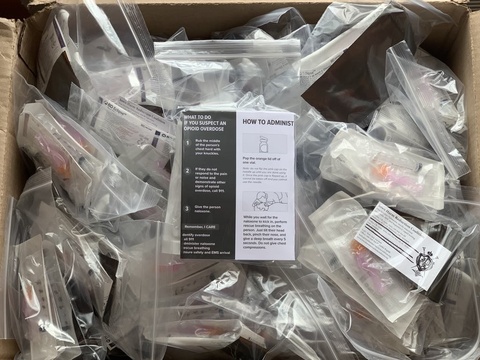
“I kept a ton of supplies in the trunk of my little Chevy Malibu so that whenever someone called, I would be able to go and deliver it,” he says.
Hooyer participated in the Carver College of Medicine’s Des Moines Area Medical Education Consortium and spent a year learning in Des Moines, where he gained experience in community-based and county health care settings. During this time, he was also able to assist IHRC in its advocacy work, assist with writing grants and whitepapers, and help establish a Des Moines branch office.
“It’s incredible the way the organization has expanded,” he says. “I became very close friends with not just some of the founders but also the medical directors and the clients, as well.”
The service track gave Hooyer the tools and opportunity to provide hands-on, on-the-ground assistance to populations often overlooked in health care.
“My experiences really helped me reflect on why I’m doing what I’m doing and the effect it’s going to have,” he says. “I follow the Hippocratic Oath, which says, ‘Do no harm.’ Approaching that oath from a lens of service will give you a very good consideration not just for patients but also for resource management, your coworkers, and the health system at large.”
It also helped Hooyer better define the career he was looking to build.
“Service is a verb, in my mind; it’s something that you do,” he says. “It’s easy to go about it and say, ‘I’m doing good.’ But this work is not for everyone. The Service Distinction Track organized my thoughts around outcomes so I could have an appreciation for what my actions as a practitioner are going to do.”
Now an emergency medicine resident physician at the University of Michigan, Hooyer continues to work with underserved populations through the institution’s affiliated community and county hospitals. He believes his experience with harm reduction will continue to inform his role as a compassionate emergency medicine physician when he begins practicing in Tacoma, Washington next summer.
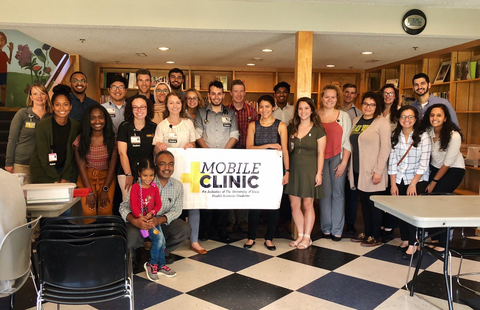
Care anywhere
For Hooyer’s classmate Joyce Wahba, MD, the connection to service is rooted in her family’s immigrant experience. Her parents moved to the U.S. from Egypt shortly before she was born.
“I grew up seeing my family and other families within our church struggle to navigate the health care system,” Wahba says. “That’s something that motivates me to go out of my way to help every single person.”
Wahba dedicated significant time during medical school to the University of Iowa Mobile Clinic. The clinic, which marked its 20th year of service in 2022, is an interdisciplinary student-run organization that provides free health services to uninsured and underinsured people in Iowa City and nearby communities. When Wahba first joined, they served five community sites with services like blood sugar and blood pressure checks, basic physical exams, and sports physicals for children.
“I was heavily involved with the Pheasant Ridge site, which serves many Sudanese refugees,” Wahba says. “I had no idea, moving to Iowa, that I would be using my Arabic or my Spanish language skills. But people were happy that they could speak to a provider that spoke their language and understood a little bit more of their culture.”
Wahba became a clinic coordinator for the Pheasant Ridge site and later served as one of the UI Mobile Clinic’s executive chairs. By the time she ended her tenure, the Mobile Clinic expanded from five clinic sites to 10 and added services like vision screenings and free glasses, mental health support, and social workers to help patients new to the U.S. establish health insurance coverage.
“We worked with local churches and community centers to find areas where a lot of people were uninsured or underinsured and needed that additional support,” she says.
During the COVID-19 pandemic, Wahba helped the clinic launch telemedicine services, which gave her a crash course in HIPAA-compliant technologies, patient scheduling, and the administrative side of care delivery.
“There were so many people who were worried about going to a hospital or clinic and contracting COVID, so they were not able to go to their regular doctor’s visits or get their prescriptions,” she says. “We were able to make sure that they had continued care. That was really rewarding.”
The clinic also supported people who had traveled from other countries to visit family in Iowa but could not return home due to international travel restrictions.
“They really had nowhere else to go because they didn’t have insurance in the U.S. We were even able to connect people to specialists,” Wahba says.
Wahba recently accepted a position at Cornell University in the administrative emergency medicine fellowship program, where she’ll learn more about how to run an emergency department, interface with other specialties, and make the best use of available resources for her patients.
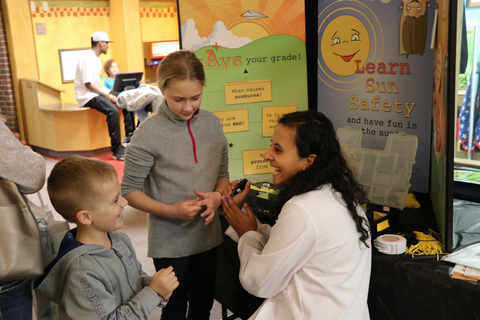
“My long-term goal would be to use these skills to help underserved patients and advocate for them on a higher level,” she says.
Her work with the UI Mobile Clinic solidified her desire to pursue emergency medicine, where she can be an understanding presence for people entering the health care system.
“A lot of people have been pushed out of that system for various reasons or have had really bad experiences,” Wahba says. “When patients come to the emergency department, it doesn’t matter why they’re there, whether they have insurance, or their socioeconomic status. My priority is to treat them as human beings and do everything I can to address their essential needs.”
The Mobile Clinic was also a practical introduction to the social determinants of health.
“It taught me to look at my patients as a whole, not as a medical complaint,” she says. “I think the benefit of the Service Distinction Track is that you can really develop your niche within service and find your skills in a particular subset, because there are so many facets to what service can be.”
Service Distinction Track
The purpose of the Carver College of Medicine Service Distinction Track is to encourage, support, and recognize medical students who work extensively with medically underserved, marginalized, and rural populations during their medical school careers.